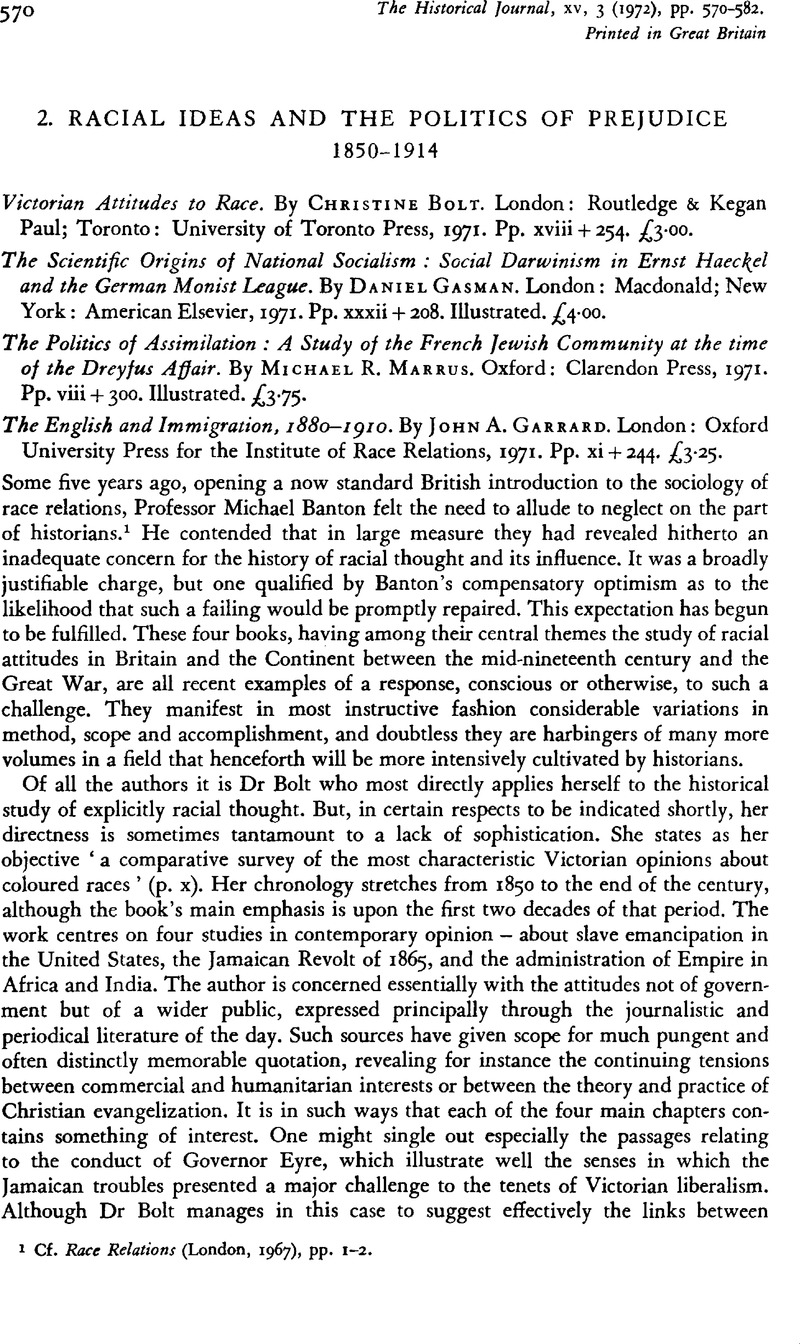Published online by Cambridge University Press: 11 February 2009

1 For a concise but sensitive account of this important feature, see Burrow, John, ‘The Uses of Philology in Victorian England’ in Robson, R. (ed.), Ideas and Institutions of Victorian Britain (London, 1967), pp. 180–204.Google Scholar
2 Evolution and Society: a Study in Victorian Social Theory (Cambridge, 1966).Google Scholar
3 I have sought to illustrate this feature (among others) in a forthcoming volume, European Racism: Aspects of History and Ideology, especially chs. in and vi. An outstanding (though, because of its elaborateness, rather extreme) example from France is discussed in my Father of Racist Ideology: the Social and Political Thought of Count Gobineau (London, 1970), perhaps especially pp. 164–72.Google Scholar
4 The Races of Men: a Fragment (London, 1850), subtitled in its second and enlarged edition (London, 1862) A Philosophical Enquiry into the Influence of Race over the Destinies of Nations.Google Scholar
5 Cf. Curtis, L. P., Jr., Anglo-Saxons and Celts: a Study of Anti-Irish Prejudice in Victorian England (Bridgeport, Conn., 1968).Google Scholar
6 Die Gelbe Gefahr: Geschichte eines Schlagworts - Studien zum imperialistischen Denizen (Gottingen, 1962). British perceptions of the peril receive particular discussion in pp. 47–67.Google Scholar
7 Cf. The Crisis of German Ideology: Intellectual Origins of the Third Reich (London, 1966), pp. 112, 220.Google Scholar
8 Cf. The Politics of Cultural Despair: a Study in the Rise of the Germanic Ideology (New York, 1965), pp. 161, 343.Google Scholar
9 Cf. Lichtheim, G., Marxism: an Historical and Critical Study (London, 1967), pt. 5, ch. IV.Google Scholar
10 Cf. Hitler's Mein Kampf: an Analysis (London, 1970), p. 67.Google Scholar
11 Der Antisemitismus: ein Internationales Interview (Berlin, 1894).Google Scholar
12 Cf. Dühring's Die Judenfrage als Racen-, Sitten- und Culturfrage (Karlsruhe, 1881).Google Scholar
13 Cf. particularly chs. I–IV (revised edn, London, 1958).Google Scholar
14 Cf. Hertzberg, A., The French Enlightenment and the Jews (New York, 1968);Google ScholarByrnes, R. F., Antisemitism in Modern France (New Brunswick, N.J., 1950);Google ScholarPoliakov, L., Histoire de l'antisémitisme—especially vol. III, De Voltaire à Wagner (Paris, 1968).Google Scholar
15 On this point a reading of Dr Marrus alongside a recent collection of essays by Professor Mosse, George, Germans and Jews: the Right, the Left, and the Search for a ‘Third Force’ in Pre-Nazi Germany (London, 1971), suggests a number of partial comparisons which have gone largely unnoticed. Cf. especially Mosse's fourth chapter, ‘The Influence of the Volkish Idea on German Jewry’. But note his warning against any excessively automatic identification of Volkism with fully-fledged racism.Google Scholar
16 Cf. principally, La France juive: essai d'histoire contemporaine (2 vols., Paris, 1886).Google Scholar
17 Cf. for example, Massing, P. W., Rehearsal for Destruction: a Study of Political Antisemitism in Imperial Germany (New York, 1949);Google ScholarPulzer, P. G. J., The Rise of Political Antisemitism in Germany and Austria (London, 1964)Google Scholar